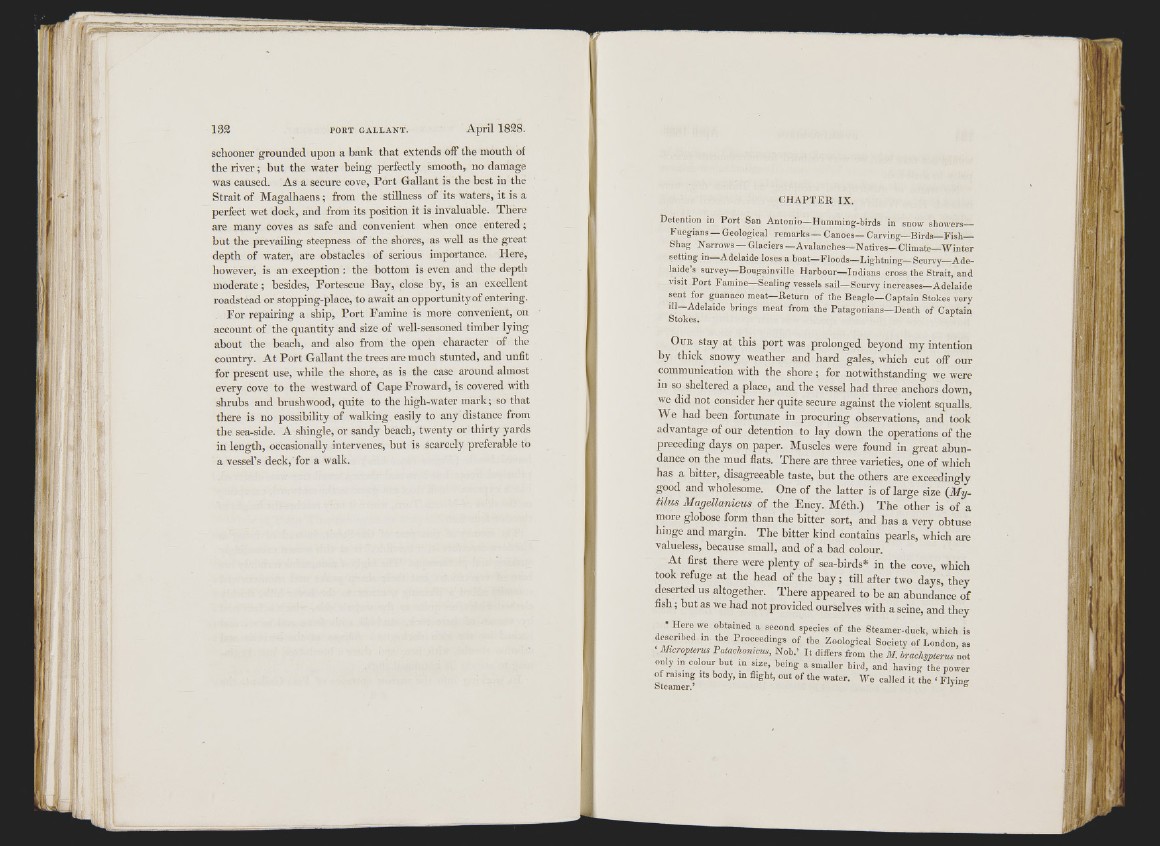
' i
li ' i
■/ ji s
•: I ;
132 FORT GAL LANT .
schooner grounded upon a bank that extends off the mouth of
the river; but the water being perfectly smooth, no damage
was caused. As a secure cove. Port Gallant is the best in the
Strait of Magalhaens; from the stillness of its waters, it is a
perfect wet dock, and from its position it is invaluable. There
are many coves as safe and convenient when once entered;
but the prevailing steepness of the shores, as well as the great
depth of water, are obstacles of serious importance. Here,
however, is an exception : the bottom is even and the depth
moderate; besides, Portescue Bay, close by, is an excellent
roadstead or stopping-place, to await an opportunity of entering.
For repairing a ship. Port Pamine is more convenient, on
account of the quantity and size of well-seasoned timber lying
about the beach, and also from the open character of the
country. At Port Gallant the trees are much stunted, and unfit
for present use, while the shore, as is the case around almost
every cove to the westward of Cape Froward, is covered with
shrubs and brushwood, quite to the high-water mark; so that
there is no possibility of walking easily to any distance from
the sea-side. A shingle, or sandy beach, twenty or thirty yards
in length, occasionally intervenes, hut is scarcely preferable to
a vessel’s deck, for a walk.
C H A P T E R IX.
Detention in P o rt San Antonio—Humming-birds in snow showers—
Fuegians — Geological remarks — Canoes— Carving—Birds—Fish—
Shag Narrows — Glaciers—Avalanches—Natives—Climate—W in te r
setting in—Adelaide loses a boat—Floods—Lightning—Scurvy—Adelaide’s
survey—Bougainville Harbour—Indians cross the Strait, and
visit P o rt Famine—Sealing vessels sail—Scurvy increases—Adelaide
sent for guanaco meat—Return of the Beagle—Captain Stokes very
ill—Adelaide brings meat from the Patagonians—Death of Captain
Stokes.
Our stay at this port was prolonged beyond my intention
by thick snowy weather and hard gales, which cut off our
communication with the shore; for notwithstanding we were
in so sheltered a place, and the vessel had three anchors down,
we did not consider her quite secure against the violent squalls.
We had been fortunate in procuring observations, and took
advantage of our detention to lay down the operations of the
preceding days on paper. Muscles were found in great abundance
on the mud flats. There ai-e three varieties, one of which
has a bitter, disagreeable taste, but the others are exceedingly
good and wholesome. One of the latter is of large size (My-
tilus Magellanicus of the Fncy. Mith.) The other is of a
more globose form than the bitter sort, and has a very obtuse
hinge and margin. The bitter kind contains pearls, which are
valueless, because small, and of a bad colour.
At first there were plenty of sea-birds* in the cove, which
took refuge at the head of the bay; tOl after two days, they
deserted us altogether. There appeared to be an abundance of
fish; but as we had not provided ourselves with a seine, and they
'H e r e we obtained a second species of the Steamer-duck, which is
described in the Proceedings of the Zoological Society of London, as
Muropte,-us Fatachoniczbs, Nob.’ I t differs from the M. brachypterus not
only m colour hut m size, being a smaller bird, and having the power
o f raising its body, in flight, out of the water. \Ye called it the ‘ Flvino-
Steamer.’ ' °
HI
'il